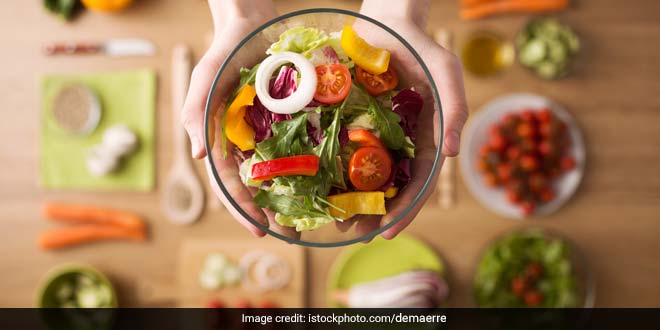Highlights
- Consume energy giving food, body building food, protective foods: Experts
- Nuts, turmeric, clove, ginger, garlic can help boost immunity
- Dr Chopra recommends drinking at least eight to 10 glasses of water
New Delhi: At a time when the Coronavirus pandemic rages on and no immediate cure is in sight, it is important to not just take precautions like washing your hands regularly, social distancing, practising coughing etiquettes and wearing masks, but also to take care of your overall physical and mental health. Diet plays an important role in this. A nutritious balanced meal can ensure a healthy body and a stronger immune system which can help fight infections. Here are some expert tips for taking care of your health and nutrition.
A Nutritious Food Plate
In a video shared by FSSAI (Food Safety and Standards Authority of India), Dr Mansi Chopra, Deputy Lead, NCEARD (National Centre of Excellence and Advanced Research on Diets) at Lady Irwin College explained what a nutritious food plate is,
A nutritious diet should have energy giving food like grains, fat; body building food like meat, fish, egg, milk and milk products, pulses; protective foods like fruits and vegetables.
Consume Fresh Fruits And Vegetables
Dr Chopra suggests choosing fresh fruits and vegetables over processed foods like fruits preserved in sugar syrup (murabba), vegetables preserved in salt water or oil (pickles), canned fruits or veggies, among others.
According to Dr Anjani Bakshi, registered dietician and Assistant Professor, Department of Food and Nutrition at Lady Irwin College, if fresh fruits and vegetables are not available one can opt for other healthier alternatives like pulses, kidney beans, and others. In a video shared by FSSAI, Dr Bakshi explained,
Sprouted beans and pulses have high nutritional value. You can also store vegetables by drying them like sun dry mint leaves, fenugreek (methi); tomato puree, ginger and garlic paste can also be stored. For breakfast, cook Dalia (broken wheat) or oats in water or milk.
Immunity Boosting Foods
A strong immune system – body’s defence against illness – leads to a stronger defence against any disease. For the same, Dr Chopra suggests immunity boosting food including almonds, walnuts, sesame seeds, black pepper, turmeric, cloves, citrus fruits like orange, ginger, and garlic, among others.
Garlic, which has been used for thousands of years in the treatment of illness and disease, has anti-inflammatory effect and results in a stronger immune system. Explaining the right way to consume it, Clinical Nutritionist Lovneet Batra said,
Take one garlic clove, mash it, and expose it to air for five minutes so that its compound called allicin which has potent medicinal properties gets activated and then have it.
Increase Fluid Intake
Dr Chopra recommends drinking at least eight to 10 glasses of water and consumption of other liquid substances like lemonade, coconut water, and buttermilk, and others.
Consume Less Sugar And Oil
The World Health Organisation recommends consuming less than 5 per cent of the daily diet as free sugar (added sugar or naturally present sugar in foods), less than 10 per cent as saturated fats, less than 1 per cent as trans fats and less than 5gms/day of salt (one teaspoon). This also means avoiding processed foods and ultra-processed foods like soft drinks and salted chips which contain preservatives, sweeteners, colouring agents, or flavours and are generally high in salt and sugar.
Also Read: Expert Blog: Five Superfoods Every Lactating Mother Should Consume
High intake of sugar and fat increases the risk of diabetes and obesity and that can further create complications during COVID-19, says Dr Chopra.
Apart from this, Dr Chopra suggests ensuring cleanliness and hygiene, especially while purchasing, storing, cooking and eating food. She also recommends standing under the sun for 30 to 40 minutes, especially between 11 AM to 1 PM as sunlight is a good source of Vitamin D, essential for strong bones.
Also Read: National Nutrition Month: Nutritional Requirements Of A Baby From 0-2 Years
NDTV – Dettol Banega Swasth India campaign is an extension of the five-year-old Banega Swachh India initiative helmed by Campaign Ambassador Amitabh Bachchan. It aims to spread awareness about critical health issues facing the country. In wake of the current COVID-19 pandemic, the need for WASH (Water, Sanitation and Hygiene) is reaffirmed as handwashing is one of the ways to prevent Coronavirus infection and other diseases. The campaign highlights the importance of nutrition and healthcare for women and children to prevent maternal and child mortality, fight malnutrition, stunting, wasting, anaemia and disease prevention through vaccines. Importance of programmes like Public Distribution System (PDS), Mid-day Meal Scheme, POSHAN Abhiyan and the role of Aganwadis and ASHA workers are also covered. Only a Swachh or clean India where toilets are used and open defecation free (ODF) status achieved as part of the Swachh Bharat Abhiyan launched by Prime Minister Narendra Modi in 2014, can eradicate diseases like diahorrea and become a Swasth or healthy India. The campaign will continue to cover issues like air pollution, waste management, plastic ban, manual scavenging and sanitation workers and menstrual hygiene.
[corona_data_new]





























